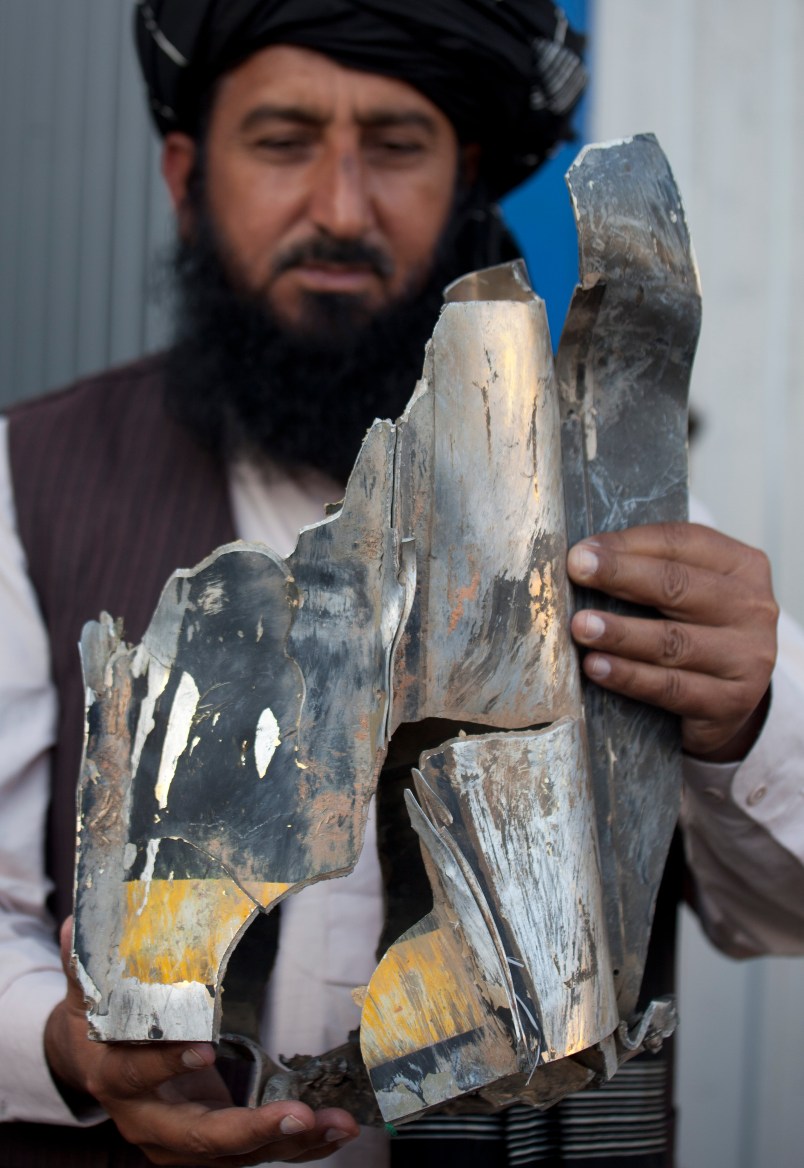ISLAMABAD (AP) — A Pakistani judge on Tuesday ordered that criminal charges be filed against a former CIA lawyer who oversaw its drone program and the one-time chief agency operative in Islamabad over a 2009 strike that killed two people.
Former acting general counsel John A. Rizzo and ex-station chief Jonathan Bank must face charges including murder, conspiracy, terrorism and waging war against Pakistan, Justice Shaukat Aziz Siddiqui of the Islamabad High Court ruled. A court clerk and a lawyer involved the case, Mirza Shahzad Akbar, confirmed details of the judge’s ruling.
Rizzo and Bank could not be immediately reached for comment. The CIA will have no comment, spokesman Chris White told The Associated Press.
The legal action comes as the number of CIA drone strikes in Pakistan has fallen precipitously from their 2010 high, amid signs that the U.S. and Pakistan have been more closely cooperating on counterterrorism issues after years of tensions. It is unclear how the criminal charges will affect that cooperation, even though the defendants will almost certainly never see the inside of a Pakistani courtroom.
The only way the case could go forward is if U.S. officials cooperate with the Pakistani court, which is inconceivable given that the drone strikes were carried out under a program ordered by two successive U.S. presidents.
The case recalls legal charges brought by an independent magistrate in Italy against CIA officers involved in the 2003 kidnapping of a terror suspect. Nine Americans were convicted but none returned to Italy to face the charges.
Bank was sent home from Pakistan in 2010 after his cover was blown when a Pakistani man named Kareem Khan initially threatened to sue the CIA and others for $500 million over the deaths of his 18-year-old son, Zaenullah Khan, and his brother, Asif Iqbal, in a purported Dec. 31, 2009, strike on the North Waziristan tribal region.
The AP and other media organizations reported at the time that three people were killed in a missile attack that day in Mir Ali in North Waziristan. Pakistani intelligence officials said then that the men were militants, but offered no proof.
As the outrage over the lawsuit grew, protesters in Islamabad began carrying placards bearing Bank’s name as listed in the lawsuit, urging him to leave the country. The CIA didn’t move Bank, who had previously served in Baghdad, until he began receiving death threats.
The station chief’s outing spurred questions at the time of whether Pakistan’s spy service might have leaked the information, something the Pakistanis denied.
The disclosure didn’t prevent Bank from landing another sensitive job: He became chief of the Iran operations division at CIA headquarters at Langley. He later was removed from that post after CIA officials concluded he created a hostile work environment in the division. He has since been detailed to the Pentagon’s intelligence arm.
Rizzo was the CIA’s acting general counsel overseeing its drone program. He retired in 2010 and later wrote a book about his experiences at the agency.
The CIA’s drone strike program has killed al-Qaida leaders, Pakistani Taliban fighters and other militants hiding in its tribal regions even as it has evoked anger across Pakistan over allegations of widespread civilian casualties. Since 2004, the U.S. has carried out nearly 400 suspected drone strikes in the country, according to the New America Foundation’s International Security Program, which tracks the American campaign. The foundation says the last U.S. drone strike in Pakistan happened on Jan. 29 and killed at least six suspected militants.
But the number of strikes has declined from 122 in 2010 to 22 last year, the foundation shows. There have been only four reported so far this year, and many observers believe the program is winding down.
While Pakistan’s civilian government often decries the strikes, U.S. officials long have said the country’s military tolerates them and occasionally cooperates closely with them. At the height of tensions in 2010, protests against the drone program blocked a land route for months used by NATO forces to resupply troops in neighboring Afghanistan.
Under the judge’s order, Pakistan’s federal police force must file the charges against the two former CIA officials, though they’ve so far refused over what lawyers describe as a reluctance to upset the country’s diplomatic relations with the U.S. Pakistani police officials could not be immediately reached for comment Tuesday.
Pakistani lawyer Khawaja Naveed Ahmed, who is not involved in the case, said the government also could appeal the judge’s order to a higher court to try and stop having to file the charges.
In a statement after the ruling, Khan said he hoped the order would help those affected by U.S. drone strikes in Pakistan “get justice for the wrongs being done to them.”
“Today’s order is a victory for all those innocent civilians that have been killed in U.S.-led drone strikes in Pakistan,” he said. “I sincerely hope that authorities now will do their job and proceed against the culprits.”
___
Dilanian reported from Washington. Associated Press writer Jon Gambrell in Cairo contributed to this report.
Copyright 2015 The Associated Press. All rights reserved. This material may not be published, broadcast, rewritten or redistributed.
Photo: In this Thursday, Oct. 27, 2011 file photo, Pakistani tribal elder Karim Khan shows the remains of a missile reportedly fired by a U.S. drone on a village in north Waziristan, killing many people, after his news conference in Islamabad, Pakistan. (AP Photo/B.K. Bangash, File)






